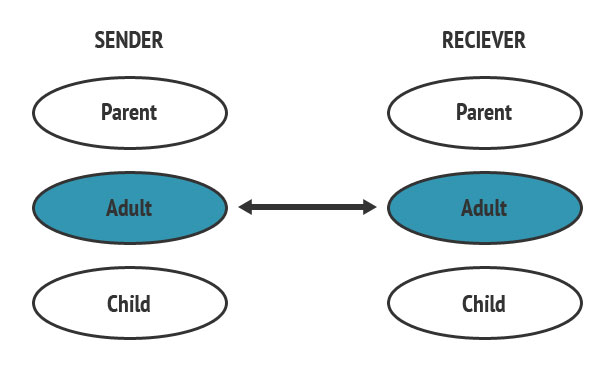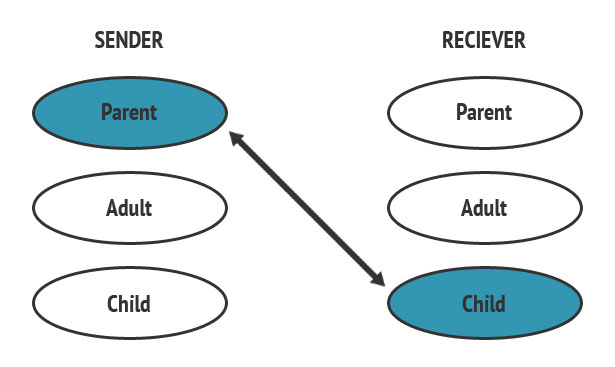Transactional Analysis was created by psychotherapist Dr. Eric Berne (1910 – 1970) from studies he conducted in the 1950s. It made complex interpersonal transactions understandable when he recognized that people can interact from one of three “ego-states”: 1. Parent, 2. Adult, 3. Child.
Each one of the ego states is a system of communication with its own language and function. The Parent’s is a language of values, the Adult’s is a language of logic and rationality, and the Child’s is a language of emotions.
Dr. Berne’s most famous book, Games People Play, opened up a new area of understanding about the complexity of overt and “covert” interpersonal communications. In enhancing the leader’s appreciation of the impact of their communication efforts – intended or not – there are a few key things we can learn from this model.
In this model, the “sender” is always the one who initiates the “transaction” or the communication interaction. There is always a “receiver” of the communication and the overall reaction is either complementary or crossed. Let’s examine each:
Complementary Transactions

Since the Adult Ego State is all about logic and rationality, we would ideally like to ensure that all communications in the workplace are Adult – Adult.
After all, we are all supposed to act like adults and that should be the basis for the vast majority of our communications in the workplace.
In reality, it often doesn’t work that way so let’s examine crossed transactions.
Crossed Transactions

In a crossed transaction, the most frequently problematic issue is the Parent – Child communication.
First, let’s remind ourselves of a couple of key facts about this model:
- We possess all three Ego States in our consciousness. Your personality is a result of your cumulative life experiences. Who you are as a Parent, Adult, or Child is a function of these experiences, no matter how you may wish to depart from them. We will not be dealing with any psychoanalytic perspectives here and that is one of the values of the TA model. You, and whoever you are communicating with, are who you are.
- Although we can learn new behaviors and skills, often what we intend in a transaction is not how the receiver interprets it.
- All Ego States are okay in our business dealings, but you need to be sure you are using each as you intend!
In this crossed example above, where you (the Sender) are speaking to one of your staff (the Receiver), it is coming across as a Parent – Child transaction. There can be a lot of reasons for this but think of it diagnostically from each perspective:
Sender as Parent:
- You have had to follow-up several times about a deliverable so you are frustrated with your staff member’s performance. You are impatient and your disappointment is clear in your voice and body language.
- You are anxious about getting a big assignment done and need the input of your staff. They may or may not be aware of the pressure you are under, but your tension comes across.
- You are very good at details and often have valuable insights so you review things in detail and almost always have suggestions for everything your team does.
Receiver as Child:
- I’m trying here and I feel I have disappointed Mom or Dad.
- My boss sounds like my Dad or Mom when I was a teenager and came home after curfew.
- They feel like you may not trust them to perform adequately, even when they have been doing the work for some time.
The key here is to heighten your awareness of how your communication is being received. If you get into the Parent – Child mode too often with a subordinate, it can be very frustrating. Examine:
- The relationship you have established with them. Do they fit the team and are they responsive to your style? Have you invested enough time to have them understand your expectations?
- Do they have the skills and training they need to succeed? Can they do what you are asking?
Further Background on Transactional Analysis
Ego States and Transactions
People’s interactions are made up of transactions. Any one transaction has two parts: the stimulus and the response. Individual transactions are usually part of a larger set. Some of these transactional sets or sequences can be direct, productive and healthy or they can be devious, wasteful and unhealthy.
When people interact they do so in one of three different ego states. An ego state is a specific way of thinking, feeling and behaving and each ego state has its origin in specific regions of the brain. People can behave from their Parent Ego State, Adult Ego State, or Child Ego State. At any one time, our actions come from one of these three ego states.
- The Parent: The Parent is like a tape recorder. It is a collection of pre-recorded, pre-judged, prejudiced codes for living. When a person is in the Parent ego state, she thinks, feels and behaves like one of her parents or someone who took their place. The Parent decides, without reasoning, how to react to situations, what is good or bad, and how people should live. The Parent judges for or against and can be controlling or supportive. When the Parent is critical it is called the Critical Parent. When it is supportive it is called the Nurturing Parent.
- The Adult: When in the Adult ego state the person functions as a human computer. It operates on data it collects and stores or uses to make decisions according to a logic-based program. When in the Adult ego state the person uses logical thinking to solve problems making sure that Child or Parent emotions do not contaminate the process.
- The Child: When we are in the Child ego state we act like the child we once were. We aren’t just putting on an act; we think, feel, see, hear and react as a three or five or eight-year-old child. The ego states are fully experienced states of being, not just roles. When the Child is hateful or loving, impulsive, spontaneous or playful it is called the Natural Child. When it is thoughtful, creative or imaginative it is called the Little Professor. When it is fearful, guilty or ashamed it is called the Adapted Child. The Child has all the feelings; fear, love, anger, joy, sadness, shame and so on. The Child is often blamed for being the source of people’s troubles because it is self-centered, emotional, powerful and resists the suppression that comes with growing up.
Complementary and Cross Transactions
Transactions occur when any person relates to any other person. Each transaction is made up of a stimulus and a response and transactions can proceed from the Parent, Adult or Child of one person to the Parent, Adult or Child of another person.
A complimentary transaction involves the same ego state in each person. In a crossed transaction the transactional response is addressed to an ego state different from the one which started the stimulus.
Communication can continue between two people as long as transactions are complementary: crossed transactions are important because they disrupt communication.
—
Material adapted from the International Transactional Analysis Association (ITAA)



Leave a Reply